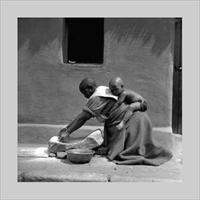AFRICA: Deadliest disease goes untested

Pneumonia and other lung infections are the number-one killers of children worldwide – deadlier than AIDS, malaria and measles combined, but in developing countries lacking medical staff and laboratories the illnesses are often treated blindly with antibiotics.
Bill & Melinda Gates Foundation recently announced it will give US$40 million to improve screenings for pneumococcal disease - the most common forms being pneumonia and meningitis.
In five developing countries yet to be selected, Gates Foundation will pay for laboratories to use screening techniques such as inflating children’s lungs with mist to get lung samples, and MassTag PCR technology to test for up to 30 causes of infection.
Samba Sow, the director of Mali’s Centre for Vaccine Development, told IRIN that improving diagnostics is just as critical to saving lives as vaccines. “A given vaccine will cure only certain serotypes [strains]. Few [sub-Saharan African] countries can say ‘here is the data, this is the vaccine we need.’”
The World Health Organization (WHO) in August 2008 approved the use of a pneumococcus vaccine in 72 countries that qualify for donations from the Global Alliance for Vaccines and Immunization (GAVI).
The alliance plans in 2009 to offer vaccines - donated by Wyeth Pharmaceuticals - that protect against seven strains of the lung disease – 1.3 million in Rwanda and 500,000 in The Gambia.
Candy
GAVI has estimated that accurate pneumonia diagnostics and vaccinations can save the lives of hundreds of thousands of children every year.
Sow told IRIN the true number of children dying from or vulnerable to pneumonia is hard to measure. WHO estimates two million deaths per year worldwide from acute respiratory infections, of which pneumonia is the most common.
Sow said when children fall ill in Africa, they are most often treated for malaria without laboratory confirmation. “People almost never think about pneumonia. If a child is lucky, the antibiotic [given] will kill the [pneumococcus] pathogens. In Africa, antibiotics are used like candy.”
Medical studies have shown that more than one-third of pathogens causing pneumococcus are resistant to antibiotics. “Patients are still at risk of dying even with antibiotics,” said Sow. “Good diagnoses can save lives. And the ideal is to have vaccines to treat those accurate diagnoses.”
 Back and Next - Back and Next
Back and Next - Back and Next See Also - See Also
See Also - See Also